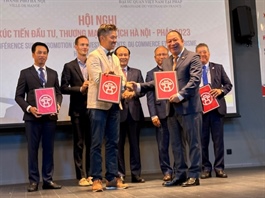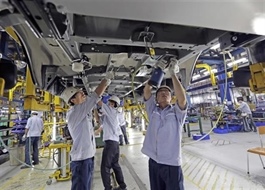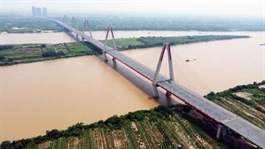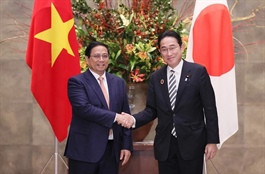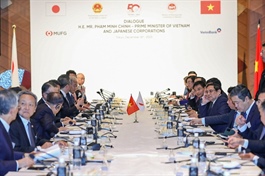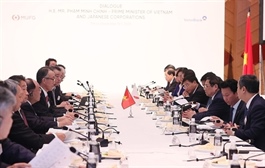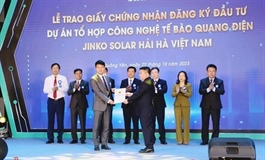Vietnam and Singapore's strategic vision for trade and investment
Vietnam and Singapore's strategic vision for trade and investment
Quang Anh and Vaibhav Saxena, lawyers at VILAF, spoke to VIR about the blossoming ties between Vietnam and Singapore.

Singapore is a nation with a proven track record for trust-worthy business practices, peace, and prosperity for all. There were times when uncertainties loomed over it in 1965 as it gained the status of an independent sovereign nation, following which, it became the 117th member of the United Nations in September 1965.
Overcoming the challenges faced by its people, it has made landmark developments for a sustainable future. Vietnam and Singapore cherish their strong bilateral relations, which led to Prime Minister of the Republic of Singapore Lee Hsien Loong's official visit to Vietnam in August, further strengthening the strategic partnership between both countries.
The said visit marked the 50th anniversary of diplomatic relations and 10 years since the establishment of the Vietnam-Singapore strategic partnership.
Singapore is geographically placed in the heart of the Southeast Asia, possessing one of the world’s busiest seaports and excellent airport infrastructure. As a core member of ASEAN, it is also credited for the establishment of numerous regional free trade zones, including ASEAN-Australia-New Zealand, ASEAN-China, and ASEAN-India.
The country’s efforts to create a smooth process for setting up businesses, high corporate governance standards, tax incentives, and other foreign-friendly policies make Singapore a global magnet for investors and an efficient gateway for ASEAN countries, including Vietnam.
Mutual partnership
Vietnam and Singapore have shared strong bilateral relations throughout history. Singapore was among the first countries to establish diplomatic relations with Vietnam in 1973. In addition, in 1992, both countries signed a bilateral investment treaty.
In 2005, the nations also executed a connectivity framework agreement, with the primary aim of linking the production, trade, investment, and consumption stages with each other to create complementarity and combine the two economies' potential.
This created a favourable policy environment for businesses of the two countries to cooperate, promoting the bilateral relationship and supporting engagements with other countries.
Singapore Cooperation Centres are also engaged in supporting the expansion of capacity building activities.
Singaporean companies have expanded their investments in Vietnam in multiple industries, including logistics, infrastructure, and more. They are also active members of free trade agreements such as the Comprehensive and Progressive Agreement for Trans-Pacific Partnership and the Regional Comprehensive Economic Partnership.
Bilateral trade between Singapore and Vietnam has been steadily rising over the last few years, thanks to the strategic partnership and free trade agreements. Vietnam was the 11th largest trading partner of Singapore, with bilateral trade clocked at $9.16 billion in 2022. This showed a rise of 11.7 per cent compared to 2021.
For the first six months of 2023, trade between the two nations reached $4.51 billion, equivalent to 49 per cent of 2022's total trade value.
Key exports from Singapore to Vietnam included iron, petroleum, and associates products, as well as computers, electronic goods and components, and beauty products, among others. Exports from Vietnam during this period were dominated by computers and electronics, electrical machinery and equipment, glass and associated products, mobile phones, vehicles, and spare parts.
In 2019, Singapore implemented the Global Connect programme to assist foreign companies and businesses investing in Vietnam. Since then, the scheme has helped more than 500 businesses and more than 400 projects in Vietnam, contributing to the expansion of investment.
During an official visit by Prime Minister Pham Minh Chinh in early 2023, the two sides agreed to further foster political trust by increasing exchanges and implementing bilateral cooperation mechanisms.
Singapore has significant expertise in financial services, serving as a financial hub for the entire region. Banking and finance, real estate, international trade, and telecommunications are some of the country's most important sectors.
Vietnam currently has 153 ventures in Singapore, with a total registered capital of more than $690 million.
According to Vietnam’s Foreign Investment Agency, Singapore has 2,866 projects in Vietnam, totalling about $67.5 billion as of March 2022. Singaporean investors are seen placing their focus on the processing and manufacturing sectors, real estate, and electricity, which account for 82.2 per cent of Singapore’s total investment in Vietnam.
A clear example of business cooperation is the presence of Vietnam-Singapore Industrial Parks at various locations in Vietnam.
Over the first 8 months of this year, Vietnam remained a favourite location for Singaporean investors, reaffirming their confidence in the Vietnamese business climate. The period saw investment of $3.83 billion, making up just over 21 per cent of the country's total.
Future prospects
Vietnam aims to remain an ideal destination for foreign investors in general, and those from Singapore in particular.
An MoU on energy cooperation was signed in October 2022 for the import of 1.2GW of low-carbon electricity from Vietnam through a 1,000km-long high-voltage subsea cable. Singapore plans to increase this to 4GW by 2035.
At the Singapore Regional Business Forum on July 7, 12 MoUs were signed between Singapore and Vietnam to promote cooperation on investment, finance, logistics, education, and innovation.
To further strengthen bilateral relations, on August 28, PM Chinh and PM Loong witnessed the signing ceremonies for seven new cooperation agreements between ministries, branches, and authorities in the two countries.
These documents included agreements on study and thematic study programmes, the amendment of the Singapore-Vietnam Connectivity Framework Agreement, the Singapore-Vietnam Innovation Talent Exchange Programme, cooperation on education, skills, and labour development, and sustainable infrastructure development in Ho Chi Minh City.
The future remains bright, with commitments made and foundations laid for strategic-economic collaboration between Vietnam and Singapore.



